“So, dogs can come to the hospital?”
The question was posed by a surprised patient as Indiana University School of Medicine—South Bend student Kennedy Onuoha walked into the examination room, accompanied by her adorably fluffy goldendoodle, Aura.
“This one is specially trained as a service dog, so she can,” Onuoha replied.
The patient smiled, seemed to understand — the dog helps calm and cheer people who are hospitalized, right? No, Onuoha explained, those are therapy dogs. “Aura is a service dog trained specifically to help me with my disabilities,” she said.
A flash of disbelief, then awe, came across the patient’s face: “You have disabilities? And they let you be a doctor?”
While she isn’t an MD just yet, Onuoha is proud to be the first IU medical student with a service dog.
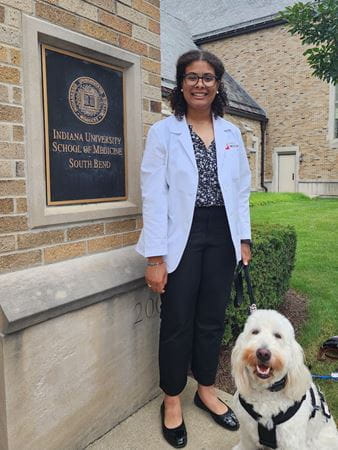 “I think it's important to address the large disparities we see in who can become a doctor,” said Onuoha, who has autism. “I get to be a trailblazer, pave the way for future students with service dogs, and actively contribute to increasing disability representation in medicine.”
“I think it's important to address the large disparities we see in who can become a doctor,” said Onuoha, who has autism. “I get to be a trailblazer, pave the way for future students with service dogs, and actively contribute to increasing disability representation in medicine.”
As many as one in four Americans lives with a disability, according to data from the Centers for Disease Control and Prevention. This includes difficulties with mobility, cognition, independent living, hearing, vision or self-care. By contrast, about 3% of physicians in the U.S. have a disability, according to the Association of American Medical Colleges.
That’s a big gap in representation.
“If we only have doctors with no disabilities, we’re missing a valuable perspective,” Onuoha said. “I’m proud of my race, I’m proud of my gender, and I’m proud of my neurotype. Even though those things might present some challenges for me, they also give me a lot of strengths. Because of them, I have acquired skills that I know will make me a good physician.”
Over the years, Onuoha has extensively practiced speech, communication and social skills, which are all important to a successful medical career. At IU School of Medicine, she is taking a leadership role with the Disability Student Interest Group, and she is an admissions ambassador for the South Bend campus.
As she heads into her second year as a medical student, Onuoha feels more confident than ever.
“I love being a medical student — I’ve wanted to do this forever,” she said. “I want other people with disabilities to know that they can do this, too.”
A (service) dog’s life
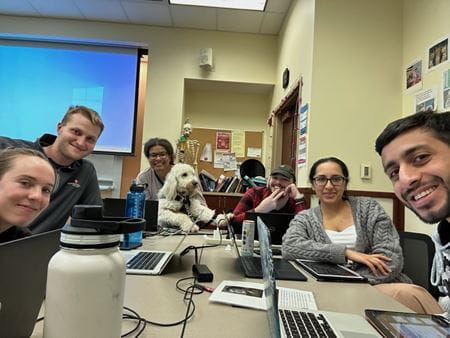 From early childhood, Onuoha knew she wanted to be a doctor. She got excited about changing batteries in her toys, saying, “OK, let’s do surgery!” Onuoha was also the kid her mother had to ban from raking leaves in the fall because she wouldn’t stop until every single leaf was removed.
From early childhood, Onuoha knew she wanted to be a doctor. She got excited about changing batteries in her toys, saying, “OK, let’s do surgery!” Onuoha was also the kid her mother had to ban from raking leaves in the fall because she wouldn’t stop until every single leaf was removed.
“I have a hard time doing things halfway, but that also makes me a good advocate,” she said.
Onuoha adopted Aura as a puppy during her junior year at The Johns Hopkins University. Aura may look like a sweet-natured, curly-haired Doodle — and she is — but Aura is also a highly trained working dog.
“Because of Aura and the way she has been specifically trained to help me, I can achieve my fullest potential and maximize my quality of life,” Onuoha said. “Being disabled comes with a lot of difficulties, but Aura gives me the tools I need to manage them safely and independently. She opens up the world to me.”
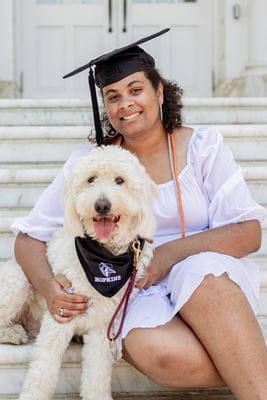 During the COVID shutdowns, while Onuoha was at her family home in Missouri, she focused her energy on training Aura to recognize and respond to specific behaviors. If Onuoha starts repetitively pulling on her hair during a test, for example, Aura nuzzles her hand away. Aura can also sense when Onuoha is dehydrated or feeling anxious, and she is trained in deep pressure therapy, meaning Aura places her weight on Onuoha in a specific position to help with emotional regulation or physical pain.
During the COVID shutdowns, while Onuoha was at her family home in Missouri, she focused her energy on training Aura to recognize and respond to specific behaviors. If Onuoha starts repetitively pulling on her hair during a test, for example, Aura nuzzles her hand away. Aura can also sense when Onuoha is dehydrated or feeling anxious, and she is trained in deep pressure therapy, meaning Aura places her weight on Onuoha in a specific position to help with emotional regulation or physical pain.
For Onuoha, it can be annoying when her mind locks onto the buzzing of fluorescent lights (she uses noise-canceling headphones) or other stimuli that neurotypical individuals easily filter out. Yet Onuoha’s ability to hyper-focus means she retains information well and is persistent — advantages that led to a full-ride scholarship to Johns Hopkins and a high score on the Medical College Admission Test (MCAT).
“Although it’s true that words and sensory information stick in my brain, so does important information,” Onuoha wrote in a post for Madison House Autism Foundation. “That is why I do well in my classes, why I’ll do well in medical school, and why I’ll be a capable doctor someday. Yes, my passions are intense, but my deep commitment to helping others and solving problems is why my patients will have such quality care.”
 At IU School of Medicine, Aura glides seamlessly into the learning environment, usually curled quietly at Onuoha’s feet. When Aura is “off duty,” the other medical students are eager to play with her outdoors on the South Bend campus.
At IU School of Medicine, Aura glides seamlessly into the learning environment, usually curled quietly at Onuoha’s feet. When Aura is “off duty,” the other medical students are eager to play with her outdoors on the South Bend campus.
Onuoha said she and Aura have felt welcomed and supported by administration, faculty, staff and peers. Aura even had her photo taken for the Class of 2027 composite. After all, she’s now in medical school, too.
Advocating for disability as diversity
When she was applying for medical schools, Onuoha searched online to understand what experiences were like for other medical students with service dogs. She found none. What little she did find on the topic was discouraging. Even the advice she received from well-intentioned professionals left her feeling like she needed to hide an important part of who she is.
“I think the takeaway message was, ‘Be yourself, but maybe just be less of some parts of yourself,” she said.
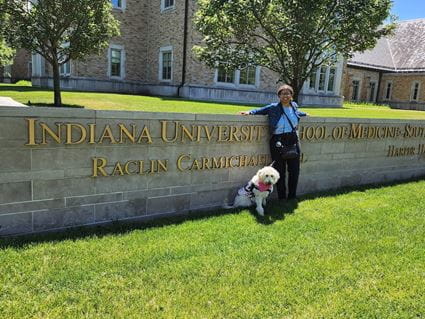 Onuoha instead chose to be candid about her disability — and its superpowers — during the medical school interview process.
Onuoha instead chose to be candid about her disability — and its superpowers — during the medical school interview process.
“It was my experience applying and interviewing with med schools that even when schools would talk about how important diversity is and all the ways they supported students from all kinds of backgrounds, disability was often not part of that conversation,” Onuoha said. “In medical education, diversity and justice are the buzzwords, but I wanted to go to a school that actually put their money there and made it a priority in their teaching.”
She was attracted to the Ethics, Equity and Justice Scholarly Concentration offered at IU School of Medicine—South Bend, where Associate Dean and Director Mark Fox, MD, PhD, MPH, has assembled a team of faculty ethicists, including himself, to build a unique program focused on exploring the moral implications of medical practices and enabling future physicians to better advocate for their most vulnerable patients.
“Anyone with lived experience involving disadvantage, marginalization and discrimination on any basis teaches others who are keenly interested through this concentration,” explained Kathleen Eggleson, PhD, whose academic and personal interests include ethics and disability.
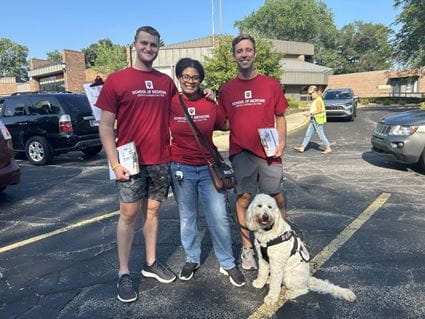 Onuoha is working with Eggleson to create a guidebook for supporting future medical students with service dogs.
Onuoha is working with Eggleson to create a guidebook for supporting future medical students with service dogs.
“For many on campus, Kennedy is the first service dog handler that they’ve known up close,” Eggleson said. “Before Kennedy even arrived, I observed a remarkable collective desire among faculty and administrators to learn what we needed to learn to not just include Kennedy and Aura as part of the campus community, but to welcome and support them as well as it could be done.”
While Aura goes almost everywhere on campus with Onuoha, she is restricted from the anatomy lab to protect her from formaldehyde exposure. During the lab portion of Onuoha’s first anatomy exam, Aura stayed in her crate — in Fox’s office, at his invitation.
Onuoha said her first year of medical school turned out to be the most supportive learning environment she has experienced since her homeschool days in early childhood.
Because Onuoha openly discusses her disability and Aura’s role as a service dog, “dozens of future physicians will move forward into their careers with Kennedy’s example in mind, expanding the impact on culture to the patients her classmates serve and the colleagues they influence,” Eggleson said.
 Ultimately, increasing the number of physicians with disabilities will benefit future patients, “with whom there is additional potential for empathy that enhances person-centered care,” Eggleson added.
Ultimately, increasing the number of physicians with disabilities will benefit future patients, “with whom there is additional potential for empathy that enhances person-centered care,” Eggleson added.
That was true for Onuoha as the patient who was surprised to learn about her disability comfortably glided into conversation about the experiences of her own son with a disability and the things he is accomplishing.
Onuoha knows she will face additional challenges as a service dog handler when she moves away from the classroom setting and into clinical rotations during the next phase of her medical training. But she has proven herself to be an effective communicator and collaborator who is not afraid to be a trailblazer.
“I’m really good at being a problem solver and overcoming issues and challenges because that’s what I’ve been doing my whole life,” she said.
Follow Onuoha and Aura on Instagram to keep up with their medical school journey.
